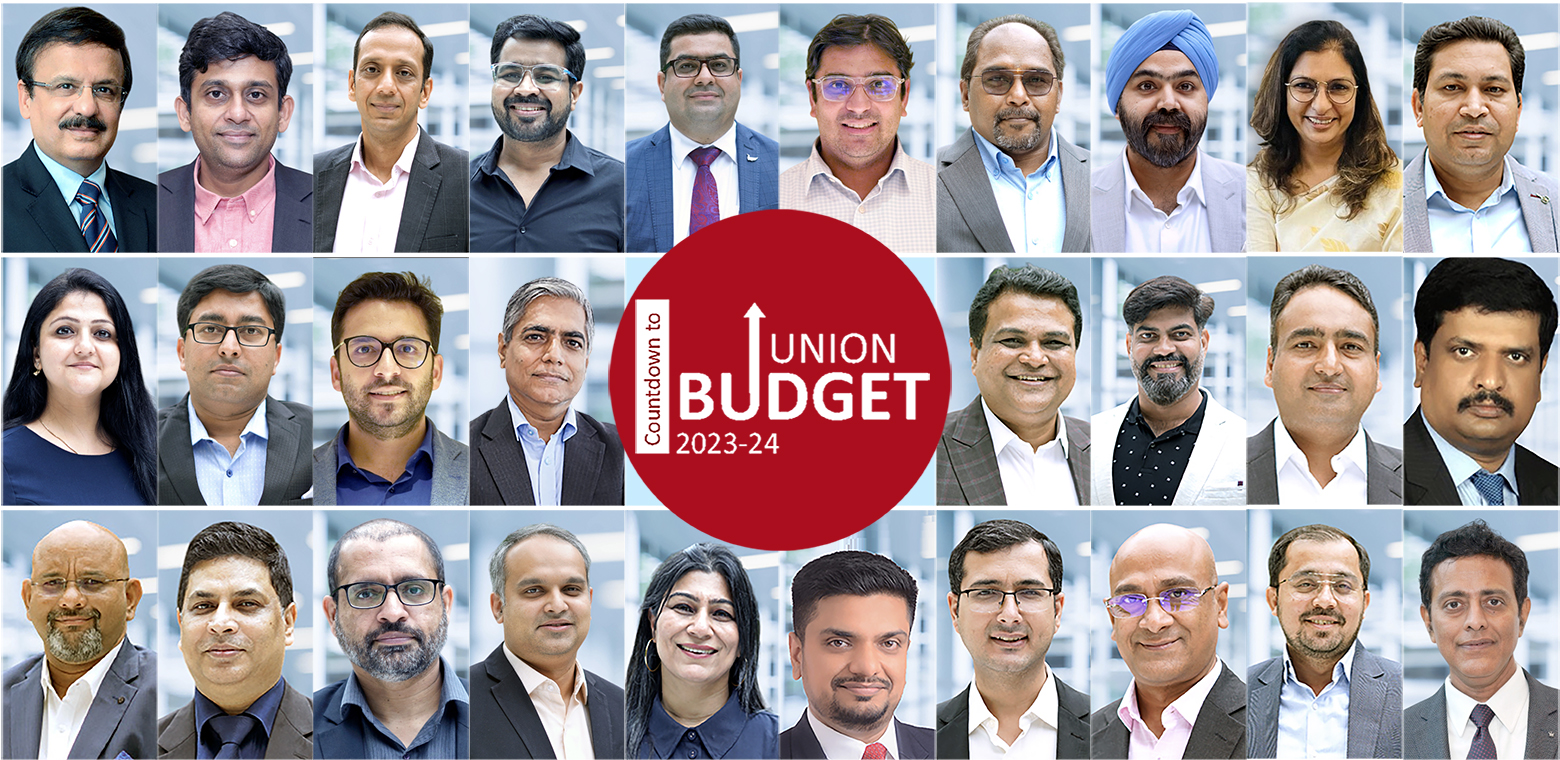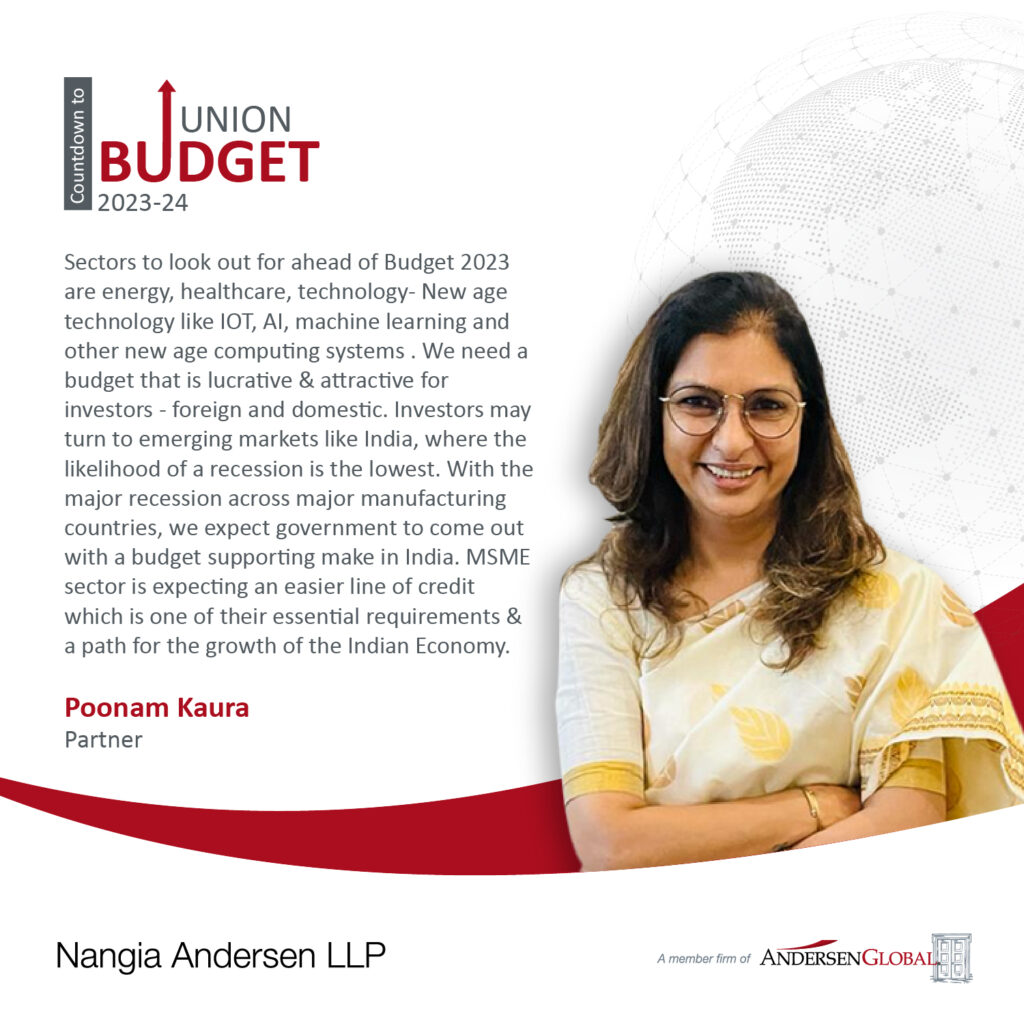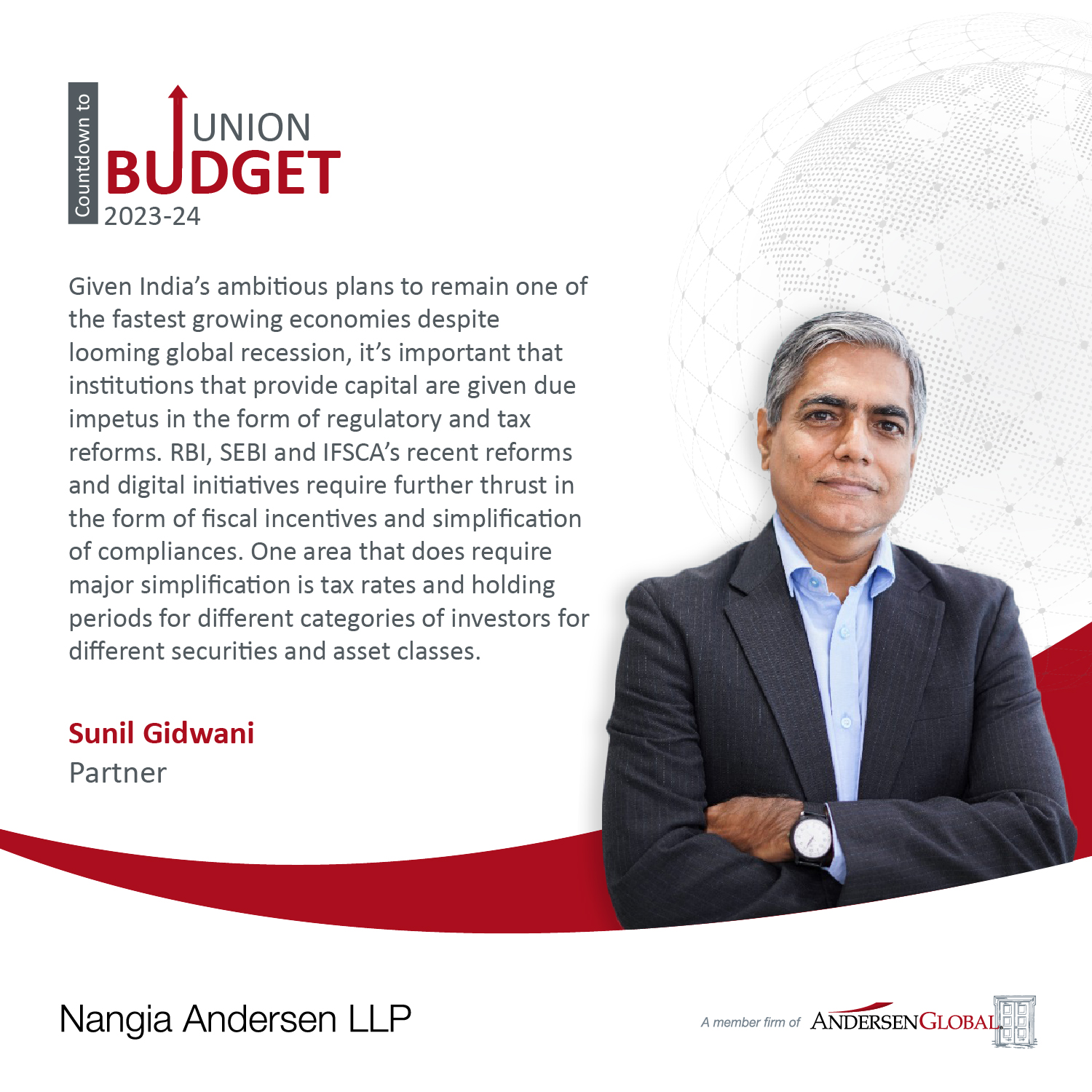We spoke to our experts on what are their expectations from Budget 2023
The countdown for Union Budget 2023 has begun, Finance Minister, Smt. Nirmala Sitharaman, will present her fifth Budget on February 1, 2023. While in conversation with our Partner- Government & Public sector Advisory, Poonam Kaura shares her expectations from Budget 2023.
According to Ms. Kaura, Sectors to look out for ahead of Budget 2023 are energy, healthcare, technology- New age technology like IOT, AI, machine learning and other new age computing systems. We need a budget that is lucrative & attractive for investors—foreign and domestic. Investors may turn to emerging markets like India, where the likelihood of a recession is the lowest. With the major recession across major manufacturing countries, we expect government to come out with a budget supporting make in India. MSME sector is expecting an easier line of credit which is one of their essential requirements & a path for the growth of the Indian Economy.
Watch our Partner- Government & Public sector advisory, Poonam Kaura, sharing expectations from Budget 2023.
According to Mr. Sachdev, “Union Budget 2023-24 is anticipated to be liberal towards taxpayers. Maintaining the growth-path while keeping fiscal deficit and inflation in check will be the key expectations from Finance Minister Nirmala Sitharaman. The growing focus towards ESG and Sustainability requires the Government to inter alia contemplate incentives for promoting renewables such as solar energy, greener/ electric vehicles, etc. India’s leap towards digital transformation would find further boost with tax incentives on capital or operational expenditure for expansion, capacity utilisation and use of new-age technology applications. Tax rate parity is also needed for Partnership Firms and LLPs that are currently taxable at a flat rate of 30 per cent by introduction of a concessional/alternate tax regime.”
Watch our Partner, Rajan Sachdev sharing expectations from Budget 2023.
According to Mr. Srivatsan, “With the revival of the capex cycle budget 2023 should action bold proposals which leave more disposable income for the taxpayer to consume and increase the buoyancy of domestic consumption. A key concern for corporate India remains the increasing cost of capital and volatility in forex markets. To calm these, bold measures which attract FDI, monetise assets and ease fiscal deficit, would be keenly watched.”
Watch our Tax Leader, Aravind Srivatsan sharing expectations from Budget 2023.
According to Mr. Ghosh, “While everyone is expecting more incentives for renewables, I hope the budget will not ignore the Distribution sector. The existing RDSS scheme is not adequate to address the current challenges facing Indian state-owned utilities in the distribution sector. Input-based franchisee models, like the Rajasthan Bhilwara model, can be game changer in the sector, we need to rethink the implementation design as Discoms are clueless and uncertain about the fund disbursal process.”
Watch our Partner- Power Sector Advisory, Arindam Ghosh sharing expectations from Budget 2023.
According to Ms. Malhotra, “Sustainable development is a scenario where we meet present needs without compromising resources for future generations. A warming planet is a major challenge for sustainability. India’s transition to renewable sources of energy is one of the most critical transitions for a sustainable future. For the journey towards sustainable energy transition, we expect Budget to allocate funds for capacity development and technology transfer. Especially for MSME’s transition to energy-efficient technologies and non-fossil fuel-based energy sources, an efficient financing mechanisms & robust policy intervention is expected from Budget 2023. Further, there is a need to address the challenges of climate finance and hence Budget is expected to announce Second Sovereign Green Bond on Waste to Energy.”
Watch our Partner- Sustainability & Development Solutions, Neha Malhotra sharing expectations from Budget 2023.
According to Mr. Jhunjhunwala, “Perduring India Inc’s aspiration for Amrit Kaal amidst concerns around the global recessionary trends warrants a calibrated approach towards introduction of policy reforms. With comprehensive framework being knit around crypto currencies to balance public interest around these decentralised digital assets, revitalisation of SEZ regulations, buzz of Digital India Act as a step towards catalysing the Digital India ambition and revamping of data privacy norms, amongst others, all eyes are on the Government to lay a smooth runway for enforcement and implementation of these emerging laws. Launching abridged mechanism to adopt the new labour codes would also help leapfrog its benefits to India’s massive workforce.”
According to Mr. Gidwani, “Given India’s ambitious plans to remain one of the fastest growing economies despite looming global recession, it’s important that institutions that provide capital are given due impetus in the form of regulatory and tax reforms. RBI, SEBI and IFSCA’s recent reforms and digital initiatives require further thrust in the form of fiscal incentives and simplification of compliances. One area that does require major simplification is tax rates and holding periods for different categories of investors for different securities and asset classes.”
According to Mr. Agarwala, “The Budget this year is going to be crucial for setting the tone in the face of an impending recession. The Ministry is expected to provide tax rebates to economically weaker section (income less than INR 800,000), allow complete deduction of interest paid on housing loans for self-occupied properties and reduce the rate of TDS in hands of self-employed professionals. The Ministry may also consider providing additional standard deductions to families with sole earning members and more dependents. Cumulatively, these measures will increase cash flow in the hands of the taxpayers and alleviate the burden of excess deduction in the hands of professionals.”
According to Mr. Panjiar, “It would not be unreasonable to expect a pragmatic budget (in the form of policies that continue to project India as an attractive investment destination) with a pinch of populistic measures (like tax incentives to salaried class, measures to reduce litigation) sprinkled over the top. In addition to the manufacturing sector, the budget should focus on the service sector keeping in mind the ultimate objective of attracting new investment and employment generation. The government should provide tax relief to companies undergoing reverse-flipping to promote setting up structures in India, tax reliefs in case of acquisition (for example on haircuts and loan waivers) during an insolvency resolution process.”
According to Mr. Jhunjhunwala, “As consumer sentiments towards home ownership witnesses a new lease of life in the aftermath of pandemic, real-estate patrons seem to have heightened expectations from Budget 2023. Not only would moderating individual tax rates unleash purchase power reinvigorating revenues in the sector, extending the tax holiday eligibility period for affordable and rental housing projects supplemented with eased up quantitative parameters for the claim would further resonate government’s ‘Housing for all’ initiative. GST waiver for under construction data centres could go a long way in augmenting investments into India’s digital ecosystem.”
According to Mr. Garg, “In the upcoming budget, one of the focus areas for the Government should be on overhauling and simplification of TDS provisions. With the introduction of multiple new sections over the years, there has been a tremendous increase in the scope of these provisions leading to higher administrative burden on tax deductors. The Government should consider reducing the number of sections and providing for a single rate for majority of transactions which will result in clarity and help in reducing litigation. Given the amount of information that is electronically available with the Government, the trail for almost every transaction is already available with the tax department now. The Government can also consider increasing the monetary threshold under respective sections for deduction of tax at source as well as lowering the rates of TDS, as higher rates typically result in higher income tax refunds.”












